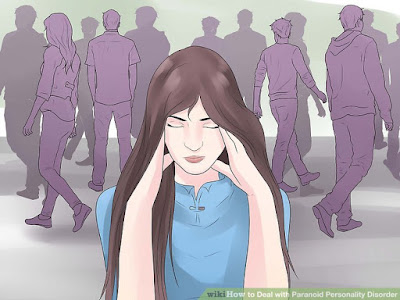Paranoid Personality Disorder is one among the eccentric personality disorder. Eccentric personality disorder is the abnormal behaviour of the person may seem unnatural or unusual to others.
PPD affected people suspect or mistrust others and believe that they will do harm to them . They mistrust the behaviours of the others . A person with PPD feels hostile and anger towards other
This is the condition where they are reluctant to easy going with others , cannot bear criticism , and finding demeaning the other's viewpoint.
Often people with PPD gets angry very quickly because they mistrust others they couldn't take the behaviour of the others.
How PPD is affected / Causes of PPD :
The Paranoid Personality Disorder cause is yet unknown but with signs and symptoms researchers have joggled some of the reasons for PPD (Paranoid Personality Disorder) in a person. They believe that it is the combination of biological and environmental factors can lead to PPD (Paranoid Personality Disorder).
What are the symptoms of Paranoid Personality Disorder
Paranoid Personality Disorder (PPD) do not accept that their point of view is wrong and they believe that their suspicion is true even they won't accept that their thought is different.
Suspects, without sufficient basis, that others are exploiting, harming, or deceiving him or her
- Is preoccupied with unjustified doubts about the loyalty or trust worthiness of friends or associates.
- Is reluctant to confide in others because of unwarranted fear the information will be used maliciously against him or her
- Reads hidden demeaning or threatening meanings into remarks or events
- Persistently bears grudges (i.e., is unforgiving of insults, injuries, or slights)
- Perceives attacks on his or her character or reputation that are not apparent to others, and is quick to react angrily or to counterattack
- Has recurrent suspicions, without justification, regarding fidelity of spouse or sexual partner.
Paranoid personality disorder generally goes undiagnosed when other psychotic disorder , such as schizophrenia or a bipolar disorder or narcissism or depressive disorder is already being diagnosed.
PPD can be caused by biological or environmental factor . Almost all age groups of people is affected by the PPD . If it exists in the childhood stage then it is known after 1 year . Most of the time at 40's and 50's age only the PPD is seem to be more.
How PPD is diagnosed ?
Paranoid personality disorder are typically diagnosed by a trained mental health professional, such as a psychologist or psychiatrist. While you can initially consult a family physician about this problem, they should refer you to a mental health professional for diagnosis and treatment.
Many people with paranoid personality disorder don’t seek out treatment. People with personality disorders, in general, do not often seek out treatment until the disorder starts to significantly interfere or otherwise impact a person’s life. This most often happens when a person’s coping resources are stretched too thin to deal with stress or other life events.
A diagnosis for paranoid personality disorder is made by a mental health professional comparing your symptoms and life history with those listed here. They will make a determination whether your symptoms meet the criteria necessary for a personality disorder diagnosis.
PPD treatment can be very successful. But people with PPD are reluctant to take up the treatment . They feel they are right in their own way . Some of the methods of treatment:
Talk therapy or psychotherapy is the best treatment for PPD . This method will
- help individual how to cope with the disorder.
- Learn how to cope with other in a social situation
- reduce the level of mistrusting others.
Medication includes :
Antidepressant.
benzodiazepines.
antipsychotics.



